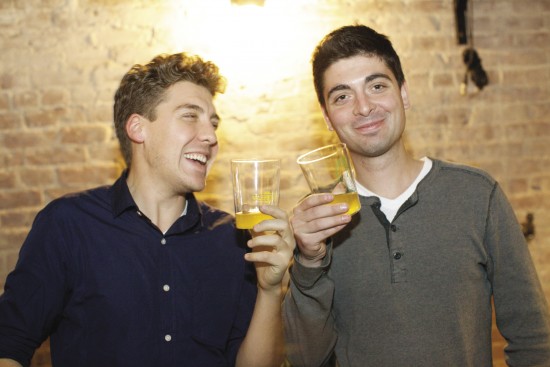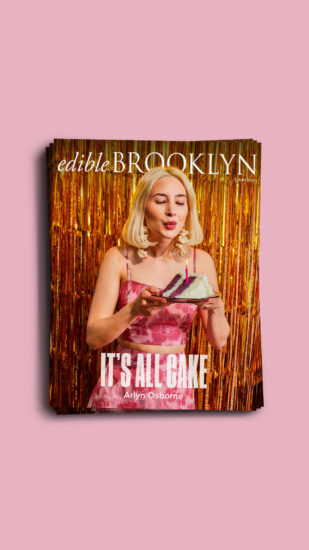Hard cider for the Big Apple.
In 2009, John Belliveau-Flores stood on an ancient Roman bridge in the Asturias region of Spain, holding his mother’s ashes. Before she succumbed to cancer, she’d left a list of places where she wished for her remains to be scattered. As he released them into the wind, he had no idea that this trip would soon put him at the forefront of the U.S. cider renaissance.
John, 30, and his brother Anthony, 28, live in Williamsburg and Bed-Stuy, respectively. But they grew up in the Finger Lakes region and from a young age traveling was the norm. (Their father, a translator who spoke nine languages, was involved in local wine tourism and also led international tours, including 60 trips to Russia during the Cold War.) After studying food history and Latin American studies at Hobart and William Smith colleges, Anthony backpacked from Colombia to Argentina, working in wineries along the way. John studied math and political science at NYU. Both were antsy, and the time to formulate a life plan was nigh.
“We just thought: How do we want to live our lives?” says John. “We want to travel. We love food. We love drink. And we love people. How do we combine these?” A mixture of restlessness and budding entrepreneurialism was bubbling up in John as he stood on that bridge in Asturias.
The provence, one of the most mountainous regions in Europe, is prized for cheese, seafood and the apple orchards and cider houses that dot the landscape. John vividly remembers his first taste of the tart, mouthwateringly acidic local cider at a roadside bar, where old men showed him the proper way to pour it. (Drinking sidra requires the ritual known as escanciado, in which the bottle is held above one’s head and poured with great skill into a glass held far below in the other hand, naturally aerating the drink as it hits the glass.)
Months later, on a rickshaw in Cambodia, John was struck with the idea of introducing more New Yorkers to hard cider. Originally he envisioned a cider bar, but during his research, John became acutely aware that the cider import market was nearly nonexistent, especially for ciders from Asturias. A new plan was born.
Together they formed Rowan Imports, the first importation and distribution company focused solely on “hard” ciders—the majority of which they import from Asturias. They shook hands outside a burger joint on Houston Street and started at square one.
“I literally Googled, ‘how to become an alcohol importer,’” laughs Anthony. “And on my first phone call to the TTB [Alcohol and Tobacco Tax and Trade Bureau], they hung up on me, so I began studying a book on how to import wine.”
“We wanted the most unique ciders,” John remembers. “So we stayed away from England and France, who already had a foothold in the import business. Asturias, however, is a region that’s underappreciated and unique. It seemed like a perfect way to establish ourselves as different.”
So the first thing they did was go back to Asturias. “Some of those first meetings were horrendous,” recalls John. “ I was trying my best to communicate through a translator. In three days, we met 22 producers. At each meeting, we basically asked, ‘So, who wants to export cider to the U.S.?’”
Most of the producers were hesitant, but a few Asturians agreed to sell them a couple of pallets of product; to the cider-makers, it was a small drop in the bucket of their production, so they decided to give the greenhorns a shot.
Back in New York, John nervously walked into Tinto Fino (now closed), the city’s first all-Spanish wine shop. Then-owner Kerin Auth recalls, “I knew immediately when I met and tasted with him that we would basically buy everything he offered. (I am pretty sure we did.) He is warm and approachable, and the kind of person you really just want to do business with. He did a great job of sourcing a variety of interesting sidra in a range from tart and racy to soft and bubbly.”
One might think selling tart, funky and carbonation-less ciders from an unknown region is pure foolishness. When Americans drink apple alcohol, it’s mostly those known as “six-pack ciders,” jacked full of carbon dioxide and sugar. Still, the U.S. hard cider market, although still a niche one, has seen extraordinary growth of late. Impact Databank, which tracks the wine, beer and spirits market, found the top 10 U.S. cider brands saw a staggering 62 percent growth in 2012. Small farmers are finding that their orchards can be made more profitable by fermenting their apples as opposed to selling them for eating. And restaurants and bars nationwide are awakening guests each day to the intricacies of ciders, made both upstate and overseas. And they’re turning to Rowan Imports for authentically made offerings to round out their well-curated beverage lists.
The Belliveau-Flores brothers struck pay dirt because people actually like drinking tart and mouth-grippingly acidic drinks. And in a market as competitive as New York City with a cadre of progressive beverage directors always looking to corner the world’s misfit beverages for their collections, Anthony and John have become the go-to peddlers of the funk.
“If the ciders are funky,” says Anthony, “we don’t hide that. We’re not trying to gain mass-market appeal. We want genuine representations of style.”
Today the Belliveau-Flores brothers house their ciders in a Moishe’s Storage Unit in Long Island City. They hung insulation on the walls and scattered free-standing air conditioners throughout the space to keep the product cool. (Electricity is included in the rental fee—thanks, Moishe!) Their apartments often serve as way stations for incoming cases.
Business has been bubbling: They now have 10 producers in their portfolio and manage 25 labels. Less than two years after launching, they’re up to 200 clients in the city, including an exclusive deal with Whole Foods to carry Val d’Boides (produced by Sidra Castanon) at all 13 of its New York stores, and their ciders are now distributed in 10 states. In Brooklyn, their funk can be found at Bierkraft, Brouwerij Lane, the Pines, Uva Wines and Dandelion Wine.
And they’re not limited to the place where it all began. Recently, two respected upstate producers, Aaron Burr Cidery in the Hudson Valley and Slyboro Ciderhouse, the “New York’s Oldest U-pick Orchard” based in the Finger Lakes, also signed on. But the brothers are picky, and are in no rush to widen their offerings.
“We care about quality and what’s in the glass,” says Anthony. Says Dan Wilson of Slyboro, “We were thrilled to be the first domestic brand in their catalog. They’re great advocates for the emerging cider industry.”
They work nonstop, but they love what they do.
“Thursday was the first day off I’ve had in three months,” says Anthony. ”But I travel around the world, selling alcohol to some of the greatest bars and restaurants. How fun is that?”
Hear Rowan Imports riff on cider culture in this Heritage Radio interview.




